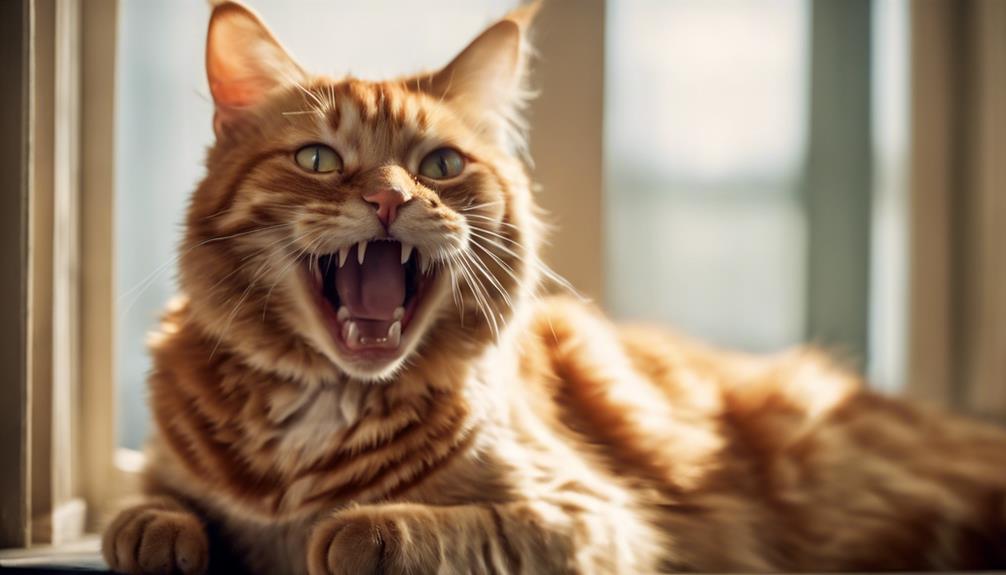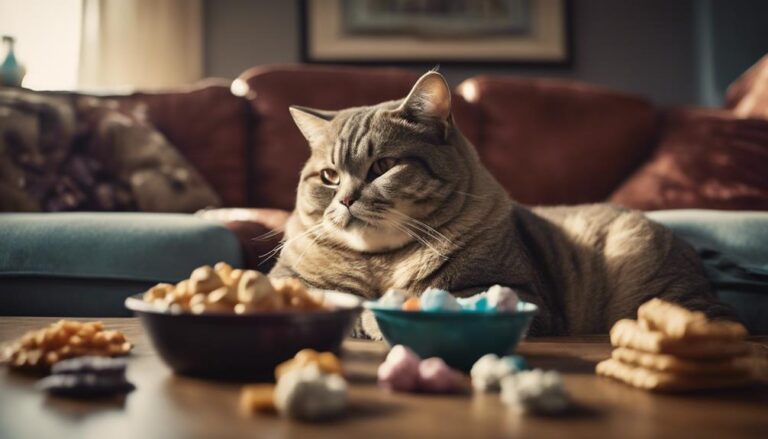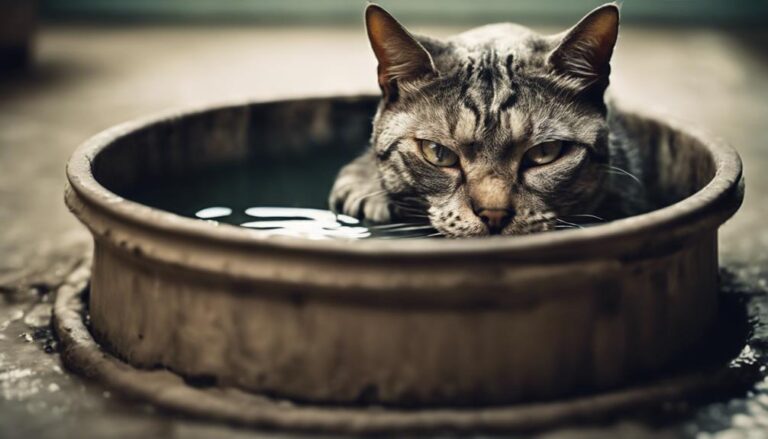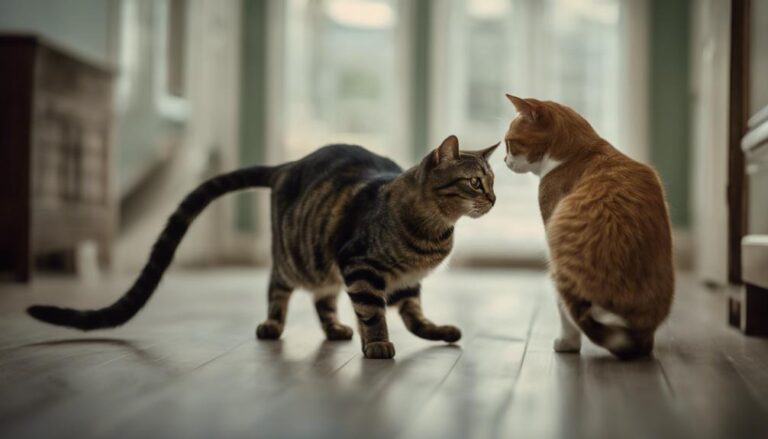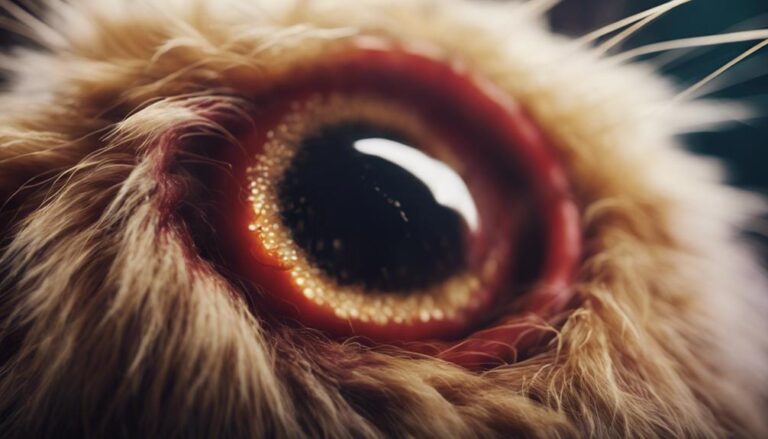If you've ever noticed your feline companion panting, you may wonder what could be causing this behavior. While it's not as common as in dogs, cat panting can signify an array of underlying issues. From potential health concerns to environmental factors, understanding the reasons behind your cat's panting is crucial for their well-being. So, next time you see your cat panting, pause for a moment and consider what might be going on – the answer might surprise you.
Causes of Cat Panting
If your cat is panting, it's essential to understand the potential causes behind this abnormal behavior. Panting in cats can be a sign of various medical conditions, stress, overheating, or an underlying disease. While some panting after exercise or in hot weather may be normal, excessive or sudden panting shouldn't be ignored. Cats, especially older ones, often hide signs of illness, making panting a crucial indicator that something may be wrong.
Several medical issues such as heart disease, asthma, respiratory infections, or even pain can lead to panting in cats. Identifying the underlying cause of your cat's panting is vital for their well-being. If you notice your cat panting excessively, it's recommended to seek immediate veterinary attention. An emergency vet can help diagnose the problem and provide the necessary treatment to address the root cause of your cat's breathing difficulties. Remember, prompt medical intervention is key to ensuring your cat's health and happiness.
Symptoms of Cat Panting
If your cat is panting excessively, pay attention to other symptoms such as lethargy, drooling, or blue gums. These signs can indicate a more serious issue that needs immediate veterinary care.
Understanding the symptoms of cat panting can help you determine when to seek medical help for your feline friend.
Causes of Panting
Panting in cats can be a concerning symptom that signals potential stress, overheating, or an underlying disease. When trying to determine the cause of your cat's panting, consider the following:
- Respiratory Distress: Issues like asthma or infections can lead to difficulties in breathing, causing your cat to pant.
- Heart Problems: Heart conditions may result in poor oxygen circulation, leading to rapid breathing and panting in cats.
- Medical Issues: Various medical problems such as lung diseases or anemia can trigger panting episodes in your feline friend.
- Serious Underlying Conditions: Sometimes, panting can be a sign of a severe underlying illness that needs immediate attention from a veterinarian to ensure your cat's well-being.
When to Worry
When observing your cat's panting, be vigilant for accompanying signs such as coughing, loss of appetite, hiding, lethargy, or labored breathing, as these could indicate a serious underlying issue. Abnormal panting in cats is a red flag for potential serious medical conditions such as respiratory infections, asthma, congestive heart failure, or heartworm.
If your cat is experiencing difficulty breathing, it's crucial to seek veterinary care promptly. During the diagnostic process, your vet may conduct physical exams and chest x-rays to determine the cause of the panting. Remember, minimizing stress during transport to the vet is important.
Prompt evaluation and treatment options like oxygen therapy, IV fluids, or medication can help manage conditions causing panting in cats.
Treatment Options
Consider consulting with a veterinary specialist for more complex cases of cat panting to ensure comprehensive treatment options are explored effectively. When addressing panting in cats, treating and managing the underlying condition is crucial.
Here are four potential treatment options to consider:
- Medications: Antibiotics, bronchodilators, or steroids may be prescribed to target the root cause of the panting.
- Oxygen Therapy: This can aid in alleviating respiratory distress in serious cases.
- Surgical Intervention: For conditions like brachycephalic airway syndrome or cancer leading to panting, surgical procedures may be recommended.
- Physical Examination: A thorough examination by a veterinarian is essential to determine the best course of action for your cat's health.
Emergency Situations and Cat Panting
In emergency situations involving cat panting, immediate veterinary attention is crucial due to the abnormal nature of this behavior in cats. Panting in cats isn't a normal occurrence and can be a sign of underlying health issues.
If your cat is panting excessively and also showing symptoms like lethargy, vomiting, or difficulty breathing, it indicates a severe emergency. Keep an eye out for signs of distress such as blue gums, which can be an alarming indication that your cat isn't getting enough oxygen.
Diagnostic Process for Cat Panting
If your cat is experiencing abnormal panting, the diagnostic process typically begins with a thorough physical examination by a veterinarian. Here's what you can expect during the diagnostic process:
- Physical Examination: The vet will assess your cat's overall health, looking for any signs of distress or underlying conditions that could cause panting.
- Blood Tests and Urinalysis: These tests help evaluate your cat's organ function and rule out certain health issues that may lead to panting.
- Diagnostic Imaging: X-rays may be necessary to check for tumors, fluid accumulation, or other abnormalities in your cat's chest that could be causing the panting.
- Specific Tests: Depending on the initial findings, your vet may recommend heartworm tests or thoracentesis to pinpoint the exact cause of your cat's panting.
Treatment Options for Cat Panting
When addressing cat panting, it is important to consider the causes and possible treatments for breathing difficulties your feline friend may be facing. Solutions like oxygen therapy, medications, or procedures such as thoracocentesis can help alleviate respiratory distress.
Causes of Panting
Stress, overheating, and underlying diseases such as heart conditions, asthma, or infections can cause cat panting, requiring immediate veterinary attention for appropriate treatment options.
- Veterinary Care: Prompt evaluation by a veterinarian is crucial to determine the underlying cause of the panting and provide the necessary treatment.
- Body Temperature: Monitoring the cat's body temperature can help identify if overheating is the cause of the panting.
- Heart Disease: Heart conditions can lead to panting in cats, and treatment may involve medications to manage the heart condition.
- Pleural Effusion: In some cases, panting could be a result of pleural effusion, where fluid accumulates around the lungs, necessitating specific procedures like thoracentesis for treatment.
Breathing Difficulty Solutions
To address breathing difficulties in cats experiencing panting, various treatment options are available to alleviate respiratory distress. If your cat is panting excessively, it could be due to underlying causes that need to be addressed.
Cat owners can help minimize stress and provide a calm environment for their feline friends. In some cases, excess fluid in the lungs may be the culprit, requiring interventions such as oxygen therapy.
Chest x-rays can help identify any abnormalities that could be contributing to the breathing difficulties. Medications like antibiotics, bronchodilators, and steroids may be prescribed to treat the root cause of the panting. These treatment options aim to improve your cat's respiratory function and overall well-being.
Vet Consultation Importance
Seeking a veterinary consultation is essential for accurately diagnosing and treating cat panting, ensuring specialized care tailored to your feline companion's specific needs. Here are some important points to consider:
- A professional vet can provide an accurate diagnosis by conducting necessary tests and examinations.
- Specialized care may involve treatment options such as oxygen therapy, medications, or even surgical interventions.
- Veterinarians have the expertise to recommend the most suitable treatment based on the underlying cause of the panting.
- By seeking vet consultation, you're ensuring the best outcome for your cat's health and well-being.
Prevention of Cat Panting
To prevent cat panting, ensure your feline friend has access to a well-ventilated and air-conditioned environment. Cats regulate their body temperature through panting, and providing a cool space helps prevent overheating. Minimize stress as much as possible, as stress can affect your cat's blood, heart, and lungs, leading to panting.
Keep your cat comfortable by offering fresh water at all times, especially during warm weather, to prevent dehydration, a common cause of panting. Additionally, monitor your cat's activity levels and avoid overexertion, particularly in hot temperatures, to reduce the strain on their heart and lungs. Regular grooming is essential to prevent matting and overheating, especially for long-haired cats.
Depending on the underlying cause, such as obesity or respiratory issues, making it difficult for your cat to pant effectively, ensuring a well-ventilated and stress-free environment is crucial in preventing cat panting.
Frequently Asked Questions
Why Is My Cat Panting With His Mouth Open?
You should take your cat to the vet if you notice them panting with their mouth open. It could be a sign of distress, overheating, or an underlying health issue. Prompt evaluation is crucial for your cat's well-being.
When Should I Worry About My Cat Panting?
If your cat is panting excessively or with other concerning symptoms like lethargy or difficulty breathing, it's crucial to seek veterinary care promptly. Don't delay; early intervention can help address any underlying health issues.
Do Cats Pant When They Are Hot?
Yes, cats pant when they are hot. It's a natural way for them to regulate their body temperature in high temperatures. Providing a cool environment and water can help prevent excessive panting due to heat.
Do Cats Pant When Sick?
When sick, cats may pant due to various health issues like respiratory infections or heart disease. Monitoring your cat's panting is crucial for early illness detection. Seek veterinary care promptly for excessive or abnormal panting.

